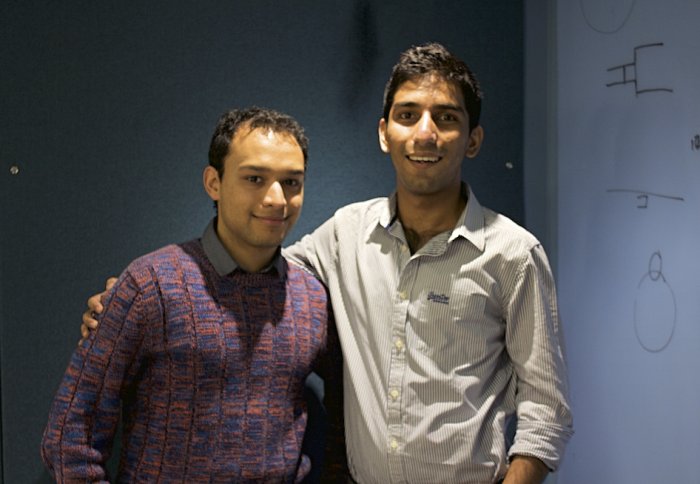MEng graduates want to redesign rocket development

Pari (in the grey shirt) with Patrick Moniz, one of his partners in The Rocket Company
Parikshat Singh started a company that aims to make sending rockets into space a much cheaper, quicker process.
Pari, a 2016 graduate from the MEng Mechanical Engineering programme at Imperial College London, is trying to turn an idea born during his studies into a company that will revolutionise how rockets are designed:
What’s your company called and what do you do?
We’re called The Rocket Company, and our team includes another MEng graduate, Patrick Moniz. We make small, low cost rockets and put them into space. Our unique selling proposition is a development process which is about 20 times more cost-effective than any previous commercial program. Traditionally, rockets cost millions to manufacture and build, but billions to develop. We can do it considerably cheaper.
How does it work?
We’re still operating in stealth mode, but what we can tell you is that we’re re-building the entire process at the core of engineering development from the ground up. Although minor improvements have been made over time, the fundamental development framework has remained unchanged since the 1960s.
Our technology is providing a much-needed overhaul. If we're right, we’ll have the opportunity to bring about a change in space exploration, but it may be part of a much larger transition in the wider engineering community.
How and when did you start the company?
I had a different idea for the company when I was a second year student, and I wanted to test it out. I worked on it separately from my actual thesis, for about a year or two. We formalised it fairly recently and now we’ve got a team of four, three of which are mechanical engineers from Imperial, working on it full-time.
We’ve got some of the smartest and most talented people with us. That’s the core team itself, but also advisors from NASA, ESA, from defence companies and from Imperial College, who have been absolutely fundamental with giving up their time and adding value to the team when we’re stuck. We’re already in talks with angel investors, and people are really keen to put money into the project. What we’re looking to do now is raise a very small round of funding, prove the technology works with a very small engine, and then scale it from there.
How was developing this company connected to your studies, and how did the College support you?
I couldn’t do this without an engineering degree, fundamentally. In addition to that, I could reach out to supervisors quite early on and say: “I’m interested in this area, but I’m not able to work on it.” And in those discussions we created projects which allowed me to explore the area, to learn about rocket propulsion and rocket design. Without that, I wouldn’t have the tools or the skills to do what I’m doing now.
What would you say to other engineering students who want to become entrepreneurs?
I never wanted to be an entrepreneur, I still don’t think I am, although once we get funded, I might be. I just really wanted to work in rocket propulsion. So my advice would be to find an area that you’re very passionate about, and to make sure you work really hard on it. Oh, and don’t be afraid to take risks! The core members of the team turned down fully-funded PhDs at Oxford and Cambridge and industry offers, and one of us quit his job and got on a one-way flight to London to make this happen.
How was your experience on the course?
Full disclosure: Mechanical Engineering is a tough course, so it’s been a humbling experience. It’s blood, sweat and tears, but provided you do give it your all, you get a huge amount back in actual value. And the lecturers are honestly some of the nicest people ever, you’re always open to knock on their door and ask questions, stay after class and work out what’s going on. The course is tough, but they make it possible and fun!
What is your fondest memory of Imperial?
All of it! On my third year literature review project, I worked with Guillermo Rein and we scoped out a really cool area, energy systems for the initial colonisation of Mars. Is a colonisation of Mars feasible? What energy sources and what power systems would you have there? I had so much fun on that. In my final year I worked with Salvador Navarro-Martinez on this rocket project, and I worked stupidly hard, but also had a really, really fun time. The group projects were great too. We built a mobility aid for people with multiple sclerosis, electric scooters, hover crafts…
Was it easy to make friends on the course?
I think the course is set up so it almost forces you to socialise; it definitely forces you to collaborate. And Mech Eng people are incredible, they’ll always try and try again and they’ll do it with a sense of humour. Our year, class of 2016, were probably one of the most social, hilarious set of weird people I’ve ever met! It was a privilege to be a part of it.
Article text (excluding photos or graphics) © Imperial College London.
Photos and graphics subject to third party copyright used with permission or © Imperial College London.
Reporter
Press Office
Communications and Public Affairs
- Email: press.office@imperial.ac.uk
